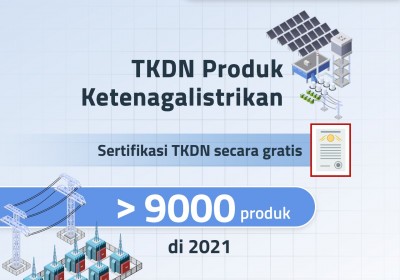Government Pushing for Higher TKDN Fulfillment in Electric Industry
September 15, 2021
JAKARTA – As part of the effort to substitute imported products, the government is encouraging the optimization of the domestic component level (TKDN) requirement in the electricity sector to encourage the development of the machinery and equipment needed to support the industry while also promoting the use of domestic products and materials.
One of the government's programs to do so is to provide free TKDN certification for at least 9,000 products in 2021. Strengthening the energy industry, particularly the electrical sector, is one of the government's biggest concerns considering that electricity is the main energy source used by the country, from civilian to industrial use.
"The public and the industries require a supply of electricity that is continuously available, affordable and sustainable. This fact is able to spur domestic industries," Industry Minister Agus Gumiwang Kartasasmita said in a written statement on Sunday (8/29).
Efforts to increase the use of domestic products and components are in line with the mandate outlined in Presidential Decree no. 14/2017 on the Acceleration of Electricity Infrastructure Development. Based on this decree, the use of local products is one of the main points in the planned construction of a 35,000 MW powerplant and a 46,000 km transmission network.
Minister Agus added that the cooperation and the openness from all relevant stakeholders in this field are needed to realize the electricity sector's goals to achieve TKDN requirements. "The involvement of domestic industries as partners in electricity projects are expected to run optimally and in accordance with the latest industrial conditions and capabilities," he said.
Industry Ministry (Kemenperin) data notes that the total value of electrical equipment imports in 2019 reached Rp 116 trillion but decreased to Rp 103 trillion in 2020. The decrease in imports shows that Indonesia's electricity sector is able to grow independently and fulfill domestic market demand on a larger scale.
There are currently around 3,404 certified electrical equipment products registered in Indonesia, all with a TKDN value below 25%, which amounts to around 413 products. Furthermore, around 664 products have fulfilled 25-40% of TKDN requirements, while 2,327 products are able to fulfill a TKDN value of more than 40%.
To help the small-to-medium industries sector (IKM), the Industry Ministry said that it has officially certified up to 230 products produced by IKMs within the 2018-2021 period, which is created by around 40 IKMs and fulfilled a TKDN value above 25%. Up to 28 of these certified IKM products were electrical equipment.
The Industry Ministry also issued a regulation on optimizing TKDN fulfillment for electricity infrastructure development, through Industry Ministry Decree no. 54/2012 concerning Guidelines for the Use of Domestic Products for Electricity Infrastructure Development.
Minister Agus believes that the policy of using domestic products and components in local equipment production, and the rapid development of the electricity infrastructure, will have a wide multiplier effort, boosting the performance of the industrial sector.
"Electricity is the heart of the industrial sector. That's why it is understandable if foreign investors who want to invest in Indonesia to always ask about the availability and guarantee of consistent electrical supply," he explained.
The domestic high-voltage electrical equipment production industry is capable of producing various products, including those for power generation, transmission and distribution. Some domestically produced electrical products that are certified with TKDN values include pressure vessels (which have a TKDN value of 15.10 to 46.80%), industrial pumps (42.80-62.67%), transformers (22.06%-60.35%), insulators (17.71%-54.08%), electrical cables (13.17-99.95%), electrical panels (17.32-75.5%), KWH meters (27.76-62.54%), connectors (19.52-41.47%), insulators (63.85-69.45%), solar modules (41.50-45.50%), and transmission towers (49.24-55.86%).
The government hopes that the average TKDN percentage implemented by industry players in all sectors reaches at least 40% by 2024.
"We continue to encourage the optimization of TKDN requirements so that it can provide a broad multiplier effect for the economy, including stimulating the business of the supporting component sectors so as to strengthen the structure of the country's manufacturing industry," said Minister Agus.
Indonesia’s Research Institutions Supporting the Development of the Electric Vehicle Industry
Indonesian Muslim Fashion and Cosmetics IKMs Shine at Dubai World Expo 2020
Govt Steps Up UMKM Transformation Efforts in the Midst of Pandemic Slowdown
Govt Encourages Promotion of IKM Products in Digital Era
Government Begins Developing Maritime Training Center in Makassar
Tweets by IDDevForum
